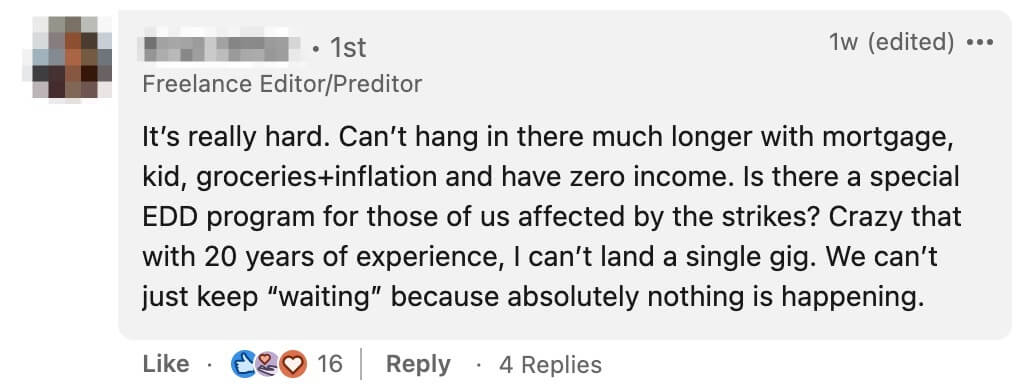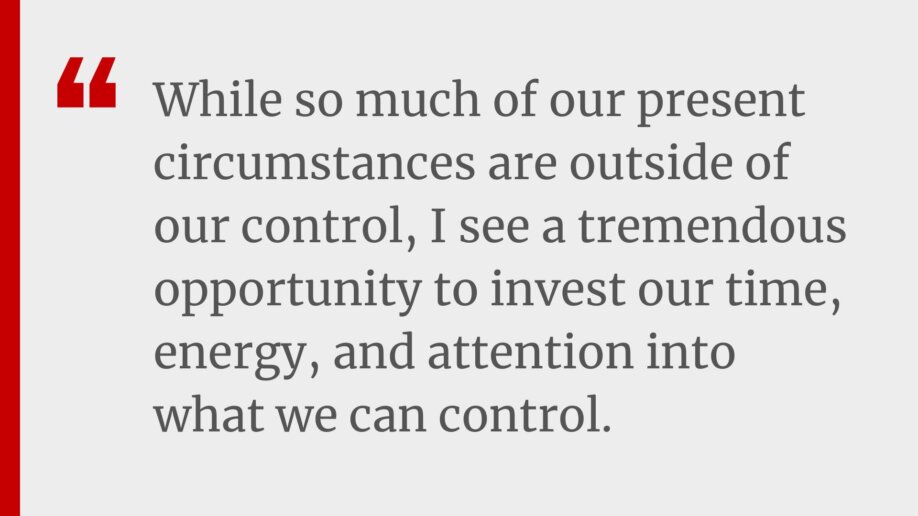It’s hard to believe it’s been a year since the industry slowdown began. Months before the strikes were even official, countless people were already reaching out to me wondering, “What’s going on? Am I the only one not hearing about work?”
Whether you’ve been unemployed for a month or a year, I can assure you:
It’s not just you.
This is the worst the job market has been for creatives in the entertainment industry in at least a generation – if not ever. And to the surprise of many, this isn’t just about actors, writers, or those working on union scripted projects directly affected by the strikes.
This slowdown is affecting EVERYONE.
Whether you are an editor, composer, 1st AD, writer, actor, or a marketing executive, agency owner, office PA, or anything in between, whether you work in commercials, trailers, unscripted, reality, docs, or scripted, the global market for entertainment content has shrunk by over 25%. Unfortunately, it’s not going to get a whole lot better this year.
From the countless conversations I’ve had via email, social media, or Zoom, whenever I ask “What’s your plan?” the most common answer I get is:
“I’m just going to have to wait it out.”
I think the hard lesson we’re all learning is that waiting is no longer working.


While so much of our present circumstances are outside of our control, I see a tremendous opportunity to invest our time, energy, and attention into what we can control.
The opportunity I believe we all must seize right now is the opportunity to get ahead of the competition that’s sitting around playing Connect Four “waiting for work to come back” and spend our time strategically mapping out the path to our dream careers like a masterful game of Chess.
Over the next five days I want to help you design your dream career by optimizing the following five areas:
- Optimizing Your Career Path
- Optimizing Your Network
- Optimizing Your Brand
- Optimizing Your Time (& Well-Being)
- Optimizing Your Finances
Part 1: Optimizing Your Career Path
When you have a clear vision and a strategy to achieve your most important goals, you then have the confidence your next move is the right move, no matter how ugly the job market might get. You can’t control the uncertainty, but you can control your reaction to it. And you can sleep well at night knowing you’re doing everything you can.
I have spent years working intimately with creatives on six continents to better understand how to design the more balanced, more sustainable, and more fulfilling careers we all deserve (but rarely find). I have also interviews countless world-class experts on economics, technology, branding, psychology, career design, and more.
I’ve boiled down the many anecdotes, the personal wins (and losses), and the countless pieces of expert advice into three simple questions that when answered make it infinitely easier to design your dream career.
- Where can I provide the most value to the world?
- What is my creative calling?
- What are the core values I’m unwilling to sacrifice for the sake of my dreams?
Once you have clear answers to these three questions, knowing how to best invest your time, energy, and attention (no matter the circumstances) becomes a lot simpler.
1. Where can you provide the most value to the world?
There’s an exercise I walk my Optimizer students through called “Maximizing Your Match Quality” that helps them more clearly understand where they can provide the most value to the world (and their employers) by finding the intersection of their:
- Past & present work experience
- Life experiences
- Skills & abilities
- Passions & interests
- Unique knowledge
- Key character traits (and core values)
Because we’ve been educated, trained, and conditioned to become square pegs that only fit into square holes, we often mistakenly believe the only value we can bring to the world is through the one area of expertise where we specialize. Everything else is “just a hobby” and not worth pursuing. And even worse, if/when we choose to make a career pivot, we’re led to believe that “we have to start over.”
But this lie couldn’t be further from the truth!
You can bring so much unique value to the world once you better understand where all of the above intersect. And more importantly, once you understand where your lifetime of experiences became transferrable skills, you can step in as valuable on day one rather than “starting over.”
2. What is your creative calling?
Finding the intersection of your experiences, skills & abilities and where they can provide the most value to employers is a great start.
But what if you hate your work?
What if the stories you’re telling have absolutely no meaning to you?
If you find yourself disconnected from your work (or even worse embarrassed by it), no matter how high your match quality is, you’ll end up burning out feeling like your skills & abilities are going to waste.
Ask yourself for a second…
Why did you choose the career path you did in the first place?
What inspired you to learn your craft?
What projects would you work on, even if you weren’t getting paid?
Only once you better understand the kinds of work (and stories) that truly inspire you can you then feel like your work is not just a job – or even a career- but ultimately your calling.
3. What are the core values you’re unwilling to sacrifice for the sake of your dreams?
Few people are fortunate enough to find work where they feel truly valuable, knowing their skills & abilities are valued. Even fewer find work where their skills allow them to fulfill a larger calling and have an impact on the world.
While those select few sound like they have it made, there is one sacrifice they – and so many others – make that goes unrecognized:
Paying “The Passion Tax.”
It’s well-documented that those who work in creative fields – especially those who are passionate about their work – are easier to exploit.
You’ll never find a doctor, lawyer, social worker, contractor, plumber, or accountant who’s willing to accept “Exposure Bucks” as a form of payment.
Yet we who LOVE the creative work we do are incredibly susceptible to exploitation because we just want the opportunity to do work we believe in and build the resume of credits necessary to do it for a living.
The only way you can build a more sustainable creative career that avoids the endless hamster wheel of exploitation and burnout is clearly defining your most important values (and the boundaries you are unwilling to cross).
Given all of the above, I’d love to know…
- Where do you think you can provide the most value to the world?
- What is your unique creative calling?
- What values are you unwilling to sacrifice for your dreams?
Tomorrow in Part 2 I’ll share some of my best strategies to optimize your network so you can build new relationships (and leverage existing ones) to be the first name on the list for upcoming projects as work returns. And more importantly, projects you’re excited about that aren’t just the next “paycheck job.”

